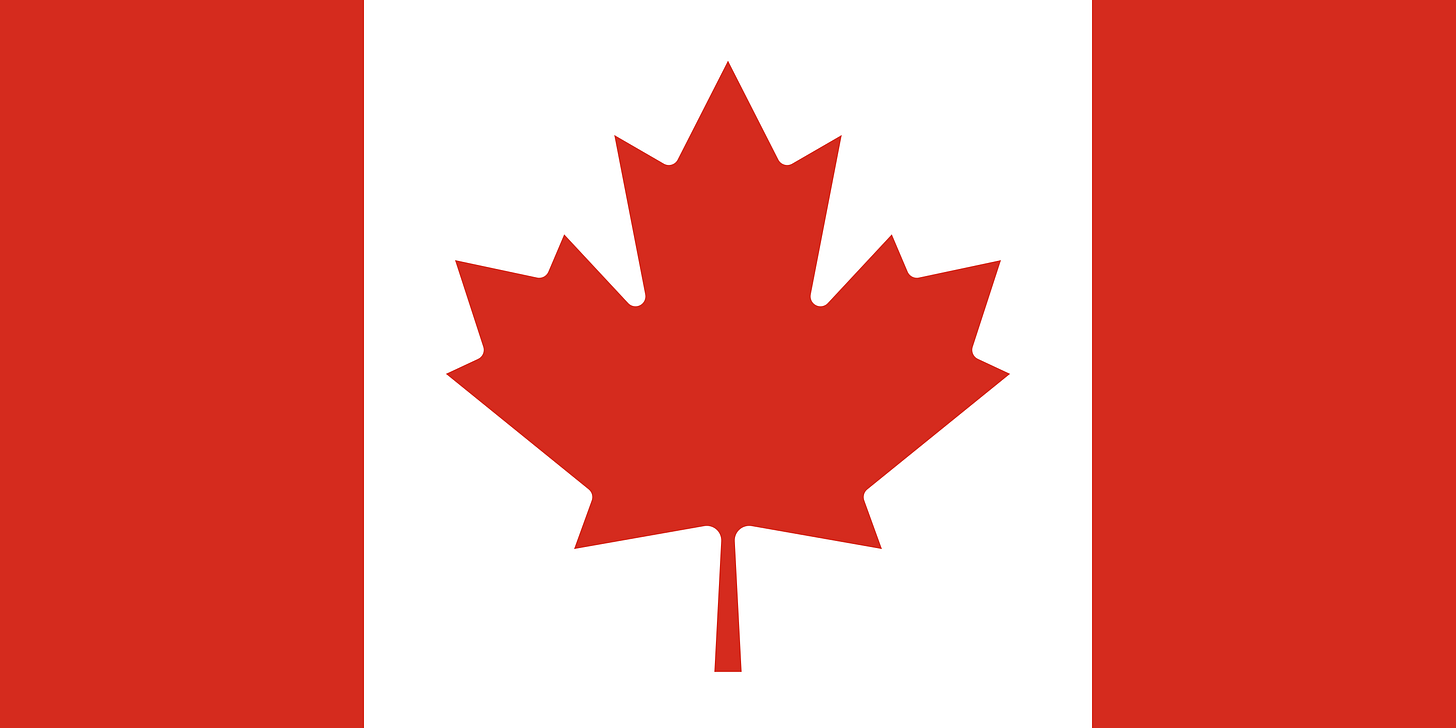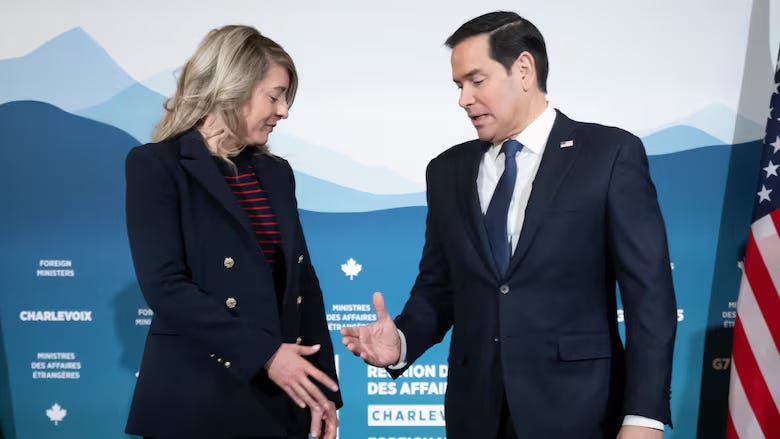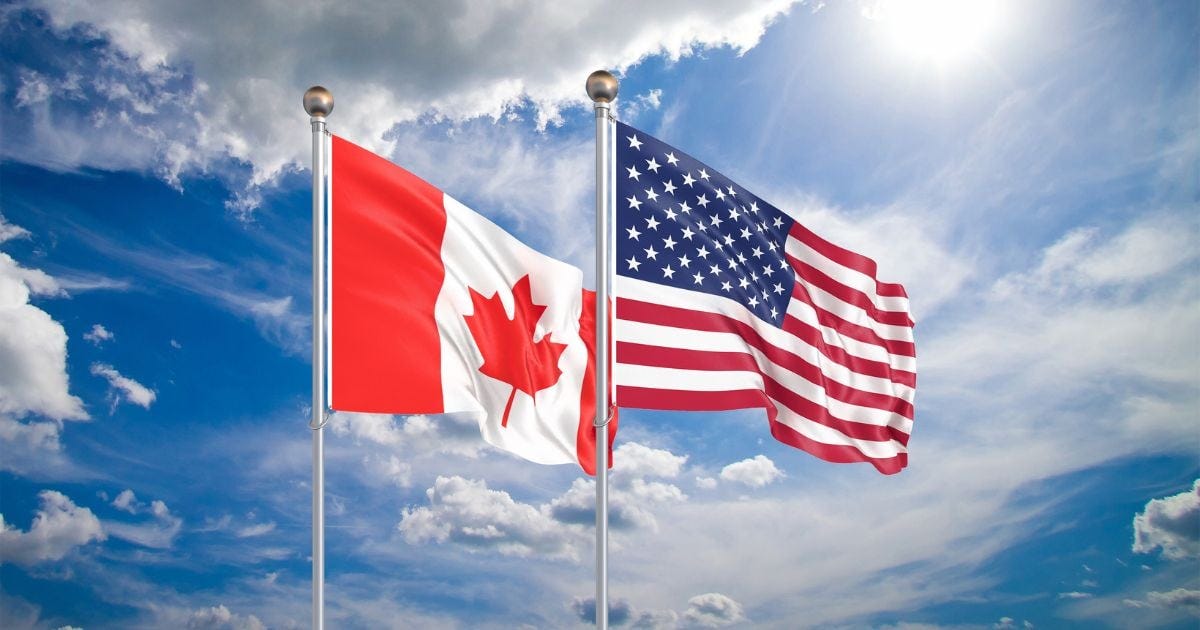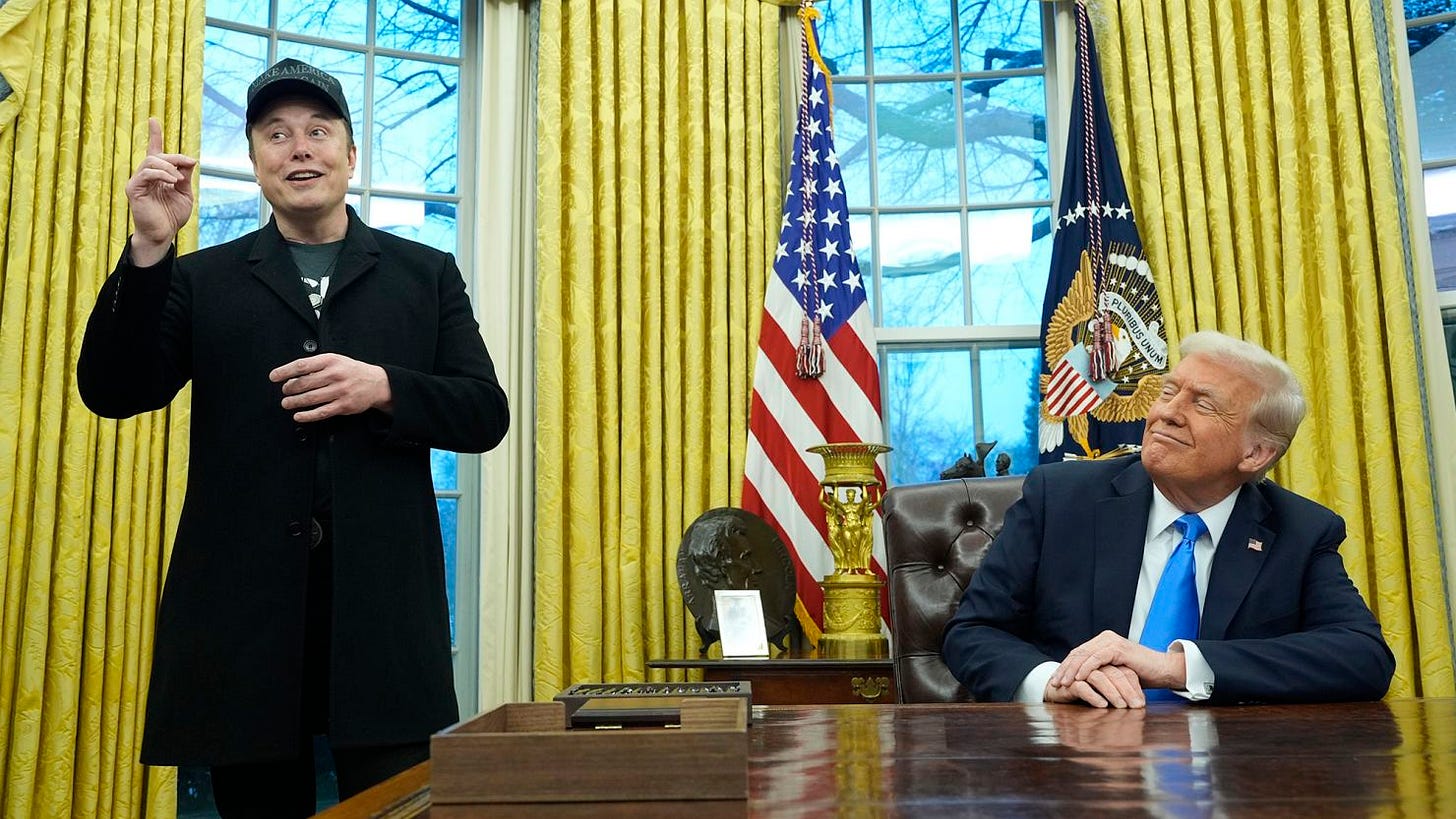It’s comforting for us Canadians to think that Donald Trump’s threats to our country aren’t serious. He’s needling us as a negotiation tactic to secure a better trade or natural resources deal. Or it’s all just a big distraction to keep his citizens’ attention away from… well, you name it. It’s just jokes, taunts, unserious rhetoric and showmanship: like the matador flourishing his red cape.
It’s comforting to pay attention only to Trump’s so-far limited actions and not to his words about the 51st state, border treaties and very large faucets.
We want to believe this because, deep within the Canadian psyche, we fear our southern neighbour. Our existence is predicated upon “how things are done” in this period of history: countries don’t invade other countries for their land and resources, but compete in a common marketplace of economies, ideas, cultures and agreements. That’s why we call it the “rules-based order”.
But if we rewind to another period, say the age of imperialism before the First World War, then why not take a country like Canada? The Americans wanted to during the Revolutionary War, the War of 1812, and with James Polk’s “54-40 or Fight!” threats in 1845.
In today’s episode of the Ezra Klein Show, Gillian Tett argues that America under Trump may be going back in time:
Now we’re seeing something that, in some ways, is back to the future — going back to a type of mercantilism and hegemonic power structure. And we don’t know where it’s going to go next.
The United States of the post-Second World War era believed that restraint itself was a form of power: it made other countries want to join the system in which the US was preeminent. But the MAGA theory of American power holds that such restraint is weakness, that soft power is feeble power, and that everyone else has just been ripping them off.
Playground Politics
We’re the little kid who is friends with the school tough guy. And even though that tough guy is becoming a real asshole, we know we can’t ever beat him in a fist-fight or even a lunchbox contest, so we laugh at his jokes, smile and nod at his stories, and sometimes join in when he targets another kid in the playground. At least it’s not us!
And like the bully’s toady, after decades of this arrangement, we have taken it for granted. Surely they have more to gain from our friendship and alliance than they’d get out of a fight? Why dismantle 80 years of US hegemony, a system of international partnerships at which the US is the centre, and the quickly eroding fact that the United States is the “world’s only truly indispensable nation”? It is a global order that they built, with our help. Surely they wouldn’t discard all that effort, all those benefits, all that power, for a few feel-good transactions? It seems like an act of profound self-mutilation.
But are we expecting the schoolyard bully to act rationally, in his own interests? What if the bully doesn’t care about his interests anymore, or know what they are? What if his own self-hatred is now being targeted at us? What if he’s just going nuts, to hell with the consequences?
A Non-Starter?
I want to believe that we can just wait this out. In four years he’ll be gone. It’s inconceivable that, in that time, he could actually annex our country. Or that Canadians would be suffering such profound economic pain that we would relent and agree to become Americans. That’s absurd, right? It’s all talk and posturing. It’s a non-starter. Right?
Last week, the New York Times reported on February phone calls between Trump and Prime Minister Trudeau, and also referenced reporting from the Financial Times and the Toronto Star. We’re starting to get a picture of what Trump wants, and it’s not just the right of US banks to operate unrestrained in Canada (um, no thanks!) or the tiny fraction of fentanyl crossing the US northern border (the biggest joke of all). Trump, apparently, wants our water, our oil and gas, our markets, our rare earth metals. He wants to review our border treaties. From the New York Times article:
He told Mr. Trudeau that he did not believe that the treaty that demarcates the border between the two countries was valid and that he wants to revise the boundary.
In fact, all our treaties are potentially meaningless now. Military cooperation? Intelligence gathering? All on the table.
Now, again, it’s comforting to think that this is all negotiation. It fits with Trump’s character, after all. Attack, attack, attack, and then claim whatever victory you can—even if it’s a defeat. Who cares if it’s all PR anyway?
But we’re not talking about Donald Trump, not really. We’re talking about his effects. We’re talking about the people around him—and the people who will succeed him. The MAGA movement will not die with Trump. And we’re talking about the momentum he creates by simply crossing lines and breaking rules. It’s the “Trump Train”, if you will, and it has a momentum all of its own. That’s why words themselves have meaning: they lead to action. Maybe Trump could care less about annexing Canada. But his brash hostility might have set events in motion where it becomes a real thing.
Or a Fait Accompli?
A fait accompli is an “accomplished fact”—something that is already done, before you even had a chance to react or consider it. Trump, whether conscious of it or not, scores faits accomplis all the time. Perhaps his greatest achievement has been to normalize the previously unthinkable. Here are some examples of what Trump has transformed from inconceivable to normal:
Trump himself. Who would have thought he could take over the Republican party and get elected president twice? There was a time when this was patently absurd.
Social media. Trump made Twitter a primary channel for presidential communications, announcing staff firings, policy shifts, and diplomatic positions there first. Who doesn’t do this now?
Conservatism. Does anyone seriously consider the Republican party to be conservative anymore? Trump’s Republicans are the radicals, while everyone else tries to hold onto the status quo.
Congress. Trump has, pretty much unilaterally, shut down entire agencies, cancelled funding, fired whole swaths of the federal workforce, without the consent or even protest of his coequal branch of government, Congress, which constitutionally has the power of the purse.
Ethics. Breaking with presidential tradition, Trump maintained ownership of his business empire while in office, establishing a precedent that wasn’t fully addressed by existing ethics frameworks.
Media. By labelling mainstream media as “fake news” and the “enemy of the people”, and reducing formal press briefings, he has fundamentally altered the relationship between the presidency and the press.
Diplomacy. Breaking diplomatic protocol by meeting directly with Kim Jong Un without the usual preliminary lower-level negotiations.
There is, of course, so much more. January 6. Attacking political opponents. Ten years ago we would say, no, he’d be impeached and convicted.
A Thought Experiment
Is the idea of making Canada the 51st state already becoming normalized? Is Canada the next fait accompli? Or is it the stuff of novels like Richard Rohmer’s Ultimatum or comedies like Canadian Bacon?
A lot of paradigms, power dynamics and political calculations would need to shift. And Trump yelling “51st state” on all channels won’t do the trick. But what if he and his circle decide, we want this? What if real strategy, energy and thought goes into it?
Here’s a scenario to show you how it could go down in less than two years.
Hey! Enjoying this? Share it with someone you think would dig it too, and nudge them to subscribe. Like and comment—I’d love to hear what you think!
January-June 2025
The first stage commences when President Trump imposes, withdraws, and imposes tariffs again, disorienting other countries as well as domestic politics and the stock market. Though fentanyl is the thin excuse, the actions towards Canada are deliberately and openly framed both as trade negotiation tactics and as measures designed to break Canada economically.
When Ottawa implements retaliatory tariffs—initially on C$30 billion of American goods, with plans to expand to C$155 billion—they are met with threats of further escalation. Trump immediately warns of additional “reciprocal” tariffs as high as 250% on Canadian dairy and lumber products. The uncertainty alone causes turmoil for the highly-integrated North American economy. This asymmetrical economic warfare makes the 2018 steel and aluminum disputes look like a neighbourly disagreement over borrowed lawn equipment—all while exposing that Canada is far more dependant on the United States than the other way around.
The historical echoes are unmistakable. In the years preceding the Mexican-American War (1846-48), the United States engaged in systematic economic strangulation of Mexico. Our current scenario unfolds at a vastly accelerated pace, but follows the same playbook. It also bears resemblance to the economic pressure applied to Hawaii before its annexation in 1898, when American business interests effectively controlled the island kingdom’s economy before formal political control was established.
Most chilling is the linguistic shift already underway: US officials now openly refer to annexation not as a hypothetical but as a policy goal. What began as off-handed remarks about Canada becoming “the 51st state” have evolved into formal White House statements describing Canada as shifting from an “ally” to a “competitor,” followed by explicit annexation proposals under the guise of economic and military “benefits” for Canadians.
June-December 2025
With the Canadian economy reeling from the economic assault, the next phase involves the systematic erosion of border integrity. The US implements mandatory registration for Canadians crossing the border, creating overnight chaos for the hundreds of thousands who regularly cross for work, family, or commerce. There is also an avalanche of stories about Canadians legitimately crossing the border but detained by ICE in inhumane conditions.
Think that’s a stretch? Check out this story of a Canadian woman who is being released just today after nearly two weeks in shackles. Canadian border officials retaliate by increasing scrutiny, inspections and detentions of Americans crossing the border, which causes a Fox News and X-stirred uproar in the US.
Water becomes a weapon when the US unilaterally reinterprets existing agreements governing the Great Lakes and other shared waterways. American businesses in border regions—particularly in areas with historic territorial disputes like Machias Seal Island in the Bay of Fundy—are quietly encouraged to assert US jurisdiction. Meanwhile, US investors, backed by government guarantees, begin buying distressed Canadian assets at fire-sale prices.
The media situations worsens when Canada, in retaliation, removes all exemptions for the small US enclave in Point Roberts. Americans speak out in support of the 1,275 residents who feel like they are being bullied and strangled by Canada.
This strategy bears eerie similarities to pre-annexation tactics used in Texas in the 1840s, where American settlers established a significant presence before any formal political action. It also echoes Russia’s approach in Crimea, where economic and social destabilization preceded more direct intervention.
People begin to ask if Canada is even capable of securing its own border, and what that means for its sovereignty.
January-July 2026
The assault on Canadian sovereignty intensifies in ways both public and subtle. The US withdraws Canada from the Five Eyes intelligence alliance, citing vague “national security concerns” that are never substantiated. The North American Aerospace Defense Command (NORAD) agreements are “revised” to give the US greater control over continental air defense. Canada acquiesces as Russia continues its aggressive posture in the Arctic.
The establishment of “economic security zones” in key Canadian border areas, such as the Fraser Valley, Alberta oilfields, virtually all of southern Ontario and New Brunswick, represents the first quasi-territorial encroachment. These zones, ostensibly created to “ensure supply chain security,” function as jurisdictional grey areas where US regulations increasingly supersede Canadian law.
Alberta Premier Danielle Smith Alberta signs an accord with the United States in exchange for zero tariffs on its energy exports, thus legitimizing these actions. Ontario’s premier, Doug Ford, nearly signs a similar agreement but backs out and keeps wearing his “Canada Is Not For Sale” hat.
This phase mirrors the gradual erosion of sovereignty seen in the Philippines and Cuba after the Spanish-American War (1898), where American military presence preceded full annexation discussions. It also has disturbing parallels to the “salami-slicing” tactics used by China against Taiwan—taking thin slices of sovereignty until the whole is effectively compromised.
July-October 2026
Following a heated hockey game at the start of the NHL season, a fight breaks out in a bar in Winnipeg. Four Americans are killed, and another three injured, in what US media immediately describes as an “anti-American hate crime.” Photos and videos of a few Canadians speaking positively about the news quickly flood social media, amplified by accounts later traced to influence operations. Unverified claims that one American was tortured before being killed spread rapidly online despite denials by the RCMP. The assailants are not immediately caught.
When the US insists on taking over the investigation and manhunt, citing “lack of capacity,” Ottawa refuses—a decision that’s portrayed in US media as obstructing justice. When the assailants are arrested barely a day later, theories abound online that the attack was coordinated, and the real perpetrators are on the loose. Similar confrontations, some real and others exaggerated or manufactured, are amplified and a narrative of persecution emerges. Many of the two million Americans living in Canada and 800,000 Canadians living in the US begin to leave, often chaotically.
A few weeks after the Winnipeg incident, the US suddenly establishes a “protective zone” for American citizens in southern Alberta—the highest per capita concentration of US citizens living in Canada. Limited military deployments follow to “ensure the safety of American citizens and interests”—a paper-thin justification for what amounts to armed incursion into sovereign territory. The Canadian Armed Forces, fearing a war they cannot win, does not engage. Canadian Forces Base Suffield, devoted mostly to army training, is caught within the protective zone and is effectively encircled.
NATO soldiers training at CFB Suffield are also caught in the middle, becoming the new focus of an international scandal. After a few days, the soldiers are permitted to evacuate, but only after Donald Trump invokes Article 13 and begins the formal one-year withdrawal process from the alliance.
The United States also begins to effectively cut off trade from Canada to the rest of the world. With just two aircraft carriers parked off either coast, the US enforces a “quarantine” meant to stop the flow of tariffed goods from coming through Canada to the US. This action is the nail in the coffin that collapses the Canadian economy.
The historical precedents here are numerous and troubling. This approach resembles the “protection of American citizens” justification used in Panama in 1989 and Grenada in 1983, but with the territorial scope of the Mexican-American War. It also bears uncomfortable similarities to the pretext used for partial occupation of Haiti in 1915 and the Dominican Republic in 1916.
October-December 2026
The endgame unfolds with breathtaking speed. The US has established additional protective zones for the entire length of the Alaska Highway in BC and the Yukon, much of the rest of southern BC, all of southern Ontario, both sides of the St. Lawrence River, New Brunswick, and Nova Scotia. Elon Musk (still in Trump’s good graces, fantastically) requests that Kingston, originally excluded from the zones, is incorporated because he “went to school there”, referring to Queen’s University. Effectively, and virtually overnight, 80% of Canadians find themselves living under American rule.
The Canadian Armed Forces, much of which is now behind enemy lines, is ordered not to resist, and begins to disband or join the United States military. A few holdouts remain, such as at CFB Cold Lake, where Canadian soldiers unilaterally declare their opposition to what they call the “invasion”, and await NATO assistance. In the one direct military conflict of this scenario, the United States attacks the base with overwhelming force. It is overrun in three days. NATO, threatened with nuclear war by its still-official ally, does nothing.
Provincial governments facing economic collapse are offered financial relief, but with strings attached to “economic integration.” A unity plan from the White House emerges as the only viable path forward for a nation whose economy now lies in ruins. The US Congress, up to this point loud but impotent in the whole affair, contemplates relief for Canada on humanitarian grounds that would come with the plan.
Referendums are held across the country, almost all of them conducted under US military supervision. The results are mixed, but are simply rerun in areas where support for integration is low. The US Congress debates a “phased integration” of Canadian provinces as US territories, with some regions fast-tracked for statehood while others remain in limbo.
Legal scholars debate whether Canadian provinces should enter as states or territories—academic discussions that normalize what would be the most significant forced territorial acquisition between developed nations in modern history.
This final phase bears resemblance to the annexation process of Hawaii, where economic dependence and military presence created the conditions for political integration. The key difference is the vastly accelerated timeline—what took decades in Hawaii compressed into mere months through coordinated economic, political, and limited military pressure. It is also similar to what has happened, and may yet still happen, in Ukraine.
The referendums and formal legal process will take years to resolve. Canada remains, on paper, a country into the 2030s. But by the start of 2027, Canada’s fate is a fait accompli.
Did you enjoy this piece? Would you value future interviews like this? If so, would you prefer more or less detail? What kind of questions would you like to be asked? Let me know!
Reading and Listening
The Ezra Klein Show: interviews with Gillian Tett and Kimberley Clausing.
The Origins of Totalitarianism by Hannah Arendt. The opening passages contain some frightening parallels to day.
Quote of the Week
“Much of what we thought was normal in the mid- to late-20th century is being ripped up. And we're going back to not just the early 20th century in economic policy but almost pre-industrialized countries, in terms of these princely power structures and tributes and things. The danger of having a tribute-based hierarchy, which is all about personal relationships and power, is that it can be capricious. It can be unpredictable. It means people don't have the confidence to plan properly.”









99.9 percent of Americans love our Canadian brothers a sister’s. Trump is a d bag sociopath,.. it’s just so dis heartening trump is treating you this way. My mom was born and raised in Manitoba my affinity stands with you!!!
Well my friend, since this article is a month old, I hope you feel a little better about things at the moment.
I mean, as an American, I certainly don't. The country I once knew is doomed in the short term. We are sustaining damage that won't be reversed any time soon, if at all. I probably won't live to see it.
But as you've seen, Trump is like a lot of bullies. He's used to people backing down from him, but he turns out to be a complete pussy when someone punches him in the mouth like Carney did. Man do I love that guy right now.
In fact, this whole 51st state thing has ironically worked out quite well for you guys; it has almost certainly saved you from years of being ruled by your own Trump Mini-Me. You now have a common enemy to unite against—like America is apparently incapable of doing at the moment—and you've triggered a flood of Trumpism-killing antibodies in your body politic that should serve you well until Trump is gone for good.
And I for one think it's a glorious thing to behold. Honestly, I couldn't be happier for you. You deserve it for being better than us.
You see, America has been a victim of its own hubris. The very ideals which allegedly made us exceptional were weaponized against us by the wealthy and powerful, all while the more good-faith idealists sat idly by and watched, believing it to be for the best.
For decades now, mendacious media tycoons have flooded our airwaves, cable networks, and social media feeds with right-wing propaganda designed to take advantage of low-information voters, using cultural wedge issues to sow division and bring out the worst in Americans. And why?
Because nobody buys trickle-down economics, yet that's what the ultra-rich want. So in order to slip one past the rubes, they trot out the old "god, guns, and gays" routine, appealing to people's egos by instilling in them a phony self-image of independent, rugged individualism. This keeps them from noticing too much how they're being screwed, while they're busy helping to screw everyone else they're convinced they hate.
But the thing about MAGA is, it really isn't a viable political movement on its own. While it capitalizes on the subculture of grievance the Republicans foolishly nurtured over the years, at the heart of it all are a bunch of freaks and losers, pseudo-intellectuals from neo-fascist think tanks who have successfully warped the minds of some among the hubristic billionaire class, but with no widespread political appeal of their own.
Nobody is voting to put Steve Bannon, Russel Vought, or Stephen Miller into power on their own. Or even J.D. Vance, at a national level.
So they need someone like Trump, who has benefitted from his ten years on TV being made to look like some big-time successful businessman, preceded by another couple decades of rich-guy tabloid celebrity. He had the mainstream credibility, which is now in tatters as his business-savvy reputation has turned out to be mostly smoke and mirrors.
In his first term, after quite often sounding like a complete ignoramus during his campaign, most people paying attention learned that he was, in fact, a lousy businessman—a born rich trust-fund baby who bankrupted several casinos, while stiffing his creditors so much he eventually couldn't get a loan from anyone but Deutsch Bank.
Which is why it was hardly surprising when he not only proved stunningly ignorant of basic concepts of economics, but also incompetent at the most elementary aspects of negotiation. Which was supposed to be his calling card. Mr. "Art of the Deal" ultimately turned out to be a complete fraud.
That is, if you were paying attention. Which Americans famously don't do, save for every four years when we feel it to be our patriotic duty to pretend we actually understand things like economic and foreign policy, then apply our utter ignorance of anything outside of our vapid cultural obsessions to decisions of grave national importance.
So many people this past year *honestly believed* Trump was going to make the economy great again. Even though it was already doing quite well, and many people failed to realize that what economic pain we had experienced was a worldwide problem.
Furthermore, having been spoiled by never before experiencing high inflation, they didn't understand that prices don't actually come down—and so they didn't realize that Trump was lying to them when he said he would bring them down.
They thought that the good economy that we had in 2017-2019 was Trump's doing, when in fact it was the economy Barack Obama had left him with, which the advisors around him mostly kept him from screwing up too badly. Advisors who, had they been paying attention, they'd have known wouldn't be there this time around.
And even the Wall Street types were fooled, expecting more of what they got from Trump's first term. So well insulated were they from the negative effects of 2016-Trump's incompetent rule that they really had themselves convinced he wasn't going to actually go through with all of this tariff nonsense.
So now here we are. A monument to what happens when Americans start rejecting knowledgeable expertise, only putting their game controllers and social media apps down long enough to pay superficial attention to current events, and believing that people like Joe Rogan or Theo Von have a clue what they're talking about.
But people are learning fast. Trump's poll numbers are falling, and for many the spell has been broken. Once you see Trump for the stupid baboon he is, it's hard to unsee, since Trump is nothing if not emphatically and unsubtly himself.
I'm pretty confident MAGA will, in fact, not survive Trump. I think it's doomed, as it's already lost most of the support it garnered among foolish young males. It will exist as it always used to be—an embarrassing subculture of backward, bigoted, religious freaks and hillbilly cretins, which people will work hard to ensure never comes close to tasting power again.
And the 51st state thing? That one's entirely Trump's deranged obsession. Forget it. Nobody supports it. It's never going to happen.
So sleep well, our friends to the North. And thank your lucky stars that you didn't turn out like your dysfunctional, damaged, downward-spiraling cousins to the South.